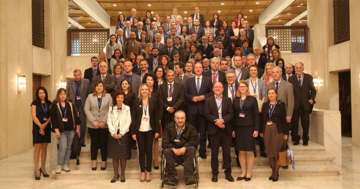Up governance model highlighted at the social economy conference organized by the EU in Bulgaria

The conference entitled « Social Economy – for an Economically Sustainable and Socially Inclusive EU » was held on April 16-17, in Sofia, Bulgaria, under the Bulgarian Presidency of the European Union.
Social and solidarity economy participants demonstrated how their dynamism is contributing to inclusive economic growth. Up group gave a presentation on its ability to constantly expand and deepen its cooperative model, including by adapting its governance to the challenges of the exponential growth, internationalization and diversification of its offer.
In the wake of the Luxembourg Declaration of December 2015 establishing « A roadmap towards a more comprehensive ecosystem for social economy enterprises », five high-level conferences were held. Slovakia (2016) and now Bulgaria (2018) have made these the highlights of their European Union presidency, while Spain (2017) and Slovenia (2018) launched the « European SSE capitals » movement.
The Social Economy, from intentions to actions in several European countries
Public authorities in most of the Central and Eastern European countries are giving support to strengthening and expanding the local ecosystems for the Social and Solidarity Economy (SSE).
The new Slovak law on the social economy is ambitious, because it is correlated with many changes in the tax code. It encourages economic operators to turn toward the social enterprise model, for instance with a preferential VAT rate of 10%, or the obligation for public purchasers to procure at least 6% of their supplies from SSE entities.
In Bulgaria, the draft law on the social economy is already generating significant expectations in the local ecosystem, which is already established and very purposeful. Furthermore, at a time when negotiations are beginning on the next multiannual financial framework 2021-2027 of the European Union, taking into account or even highlighting the social and solidarity dimension is of paramount importance.
Up group: a model of success for young SSE operators in Europe
Established in 1964, Up has grown to include 3,500 employees in nearly 20 countries. Its model of governance has been at the heart of its success from the very beginning. Following extended consultations such as only a cooperative is able to organize, the Group launched two major projects in 2014 aiming, on the one hand, to expand the number of cooperators, and on the other, to include staff representatives from its European subsidiaries in the Group’s democratic and decision-making foundations, by setting up a European Works Council (EWC).
In the vibrant SSE environment where the number of players is constantly increasing and where definitions are evolving at the same pace as technology and digitalization, Up emerges as a model of success, in terms of flexibility, governance and growth.
Social economy, digital economy, and change of scale
The foundations « ASSIST » and the «
», have shown how technology can enable people with disabilities to reach 100% working capacity or facilitate their access to employment, while reinvigorating an entire city.«
» and « SMART » have illustrated how cooperative and participatory entities can offset the drawbacks, in addition to progress and innovation, generated by certain large technological platforms and the upsurge in atypical workers (« itinerant », « nomadic », « freelance », etc.).Lastly, «
the Regional Federation of cooperatives in Occitania
», « » and « Reach for change »showed the importance of supporting young SSE operators through the processes of structuring, expanding and fundraising.Blockchain service the SSE and cooperatives, just a fad or a change of code?
In the hallways of the Conference, rumors are circulating: « ICO », « coins », « cooperative platforms »… and there is a strong chance that at the next event, digital technology will have set the stage for protocols, blockchain technology and new models of governance and value sharing. The question remains open.

























